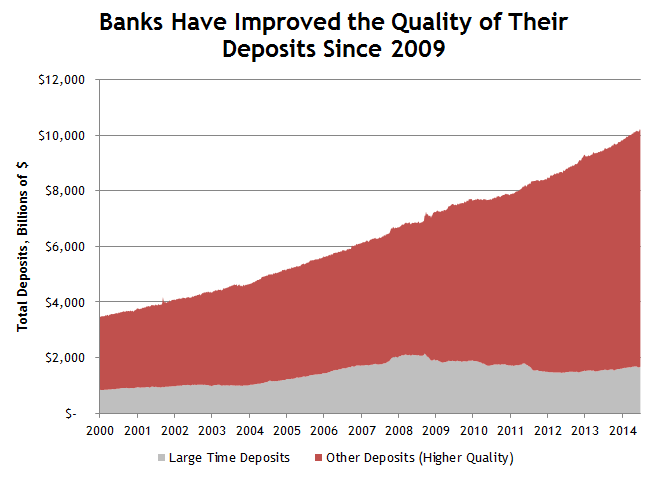During bank earnings calls this quarter, analysts have been touching on a question that is worth highlighting. That question is: will banks see large deposit outflows when QE ends?
The main reason analysts are asking the question is that J P Morgan (NYSE:JPM) warned at a banking conference in June that the system could see up to $1 Trillion in deposit outflows in the second half of 2015. JP Morgan alone is bracing for $100 billion dollars in outflows:
we estimate that we could experience during that same short time period potentially in the second half of 2015, deposit outflows of up to $100 billion (JPM: June 2014)
More Insulated
Other banks have not shared JP Morgan’s concern though. Wells Fargo (NYSE:WFC) stressed that maybe deposit growth will slow, but deposits probably wont shrink. It also thinks it is more insulated than others because it has a higher quality deposit base and strong relationships with its customers:
We found over time as you suggest early that deposit generally grow. And it might not grow as fast as but I am very confident about how all our deposit franchise will perform in a rising rate environment…I think we are going — our deposit franchise will always outperform competitors because of the nature of the kind of deposits we have and the amount of core deposits that essentially amount of retail core and I think there is going to be surprise, I think we will surprise ourselves and how well it’s going to do. (WFC: 2Q Earnings Call)
Citigroup (NYSE:C) echoed Wells’ sentiment:
when you think about the potential impact of the FED’s actions on deposits, one we’re probably less exposed than others on this, don’t forget, we’ve got of our $968 billion of deposits, it’s just a little over $400 billion are domestic deposits. So it’s not the biggest part of our book. And we, as I mentioned in response to one other question, we’ve really been managing our deposit base very carefully over the last few years. And so I think the other thing you need to consider is the quality of an institutions deposit base. And I think that what we’ve been able to achieve is an improvement in our quality of deposits, both internationally but specifically domestically, over the course of the last several years (C: 2Q Earnings Call)
The Fed 'Sucks'
Still, in JP Morgan’s most recent conference call, Jamie Dimon reiterated JP Morgan’s outlook for deposit outflows and argued that, mechanically, it’s going to have to happen because the Fed is going to suck liquidity out of the system.
the Fed whether they use repo or just sell securities that will reduce deposits. It’s a factor with an absolute formula. The question is who’s deposits, what kind of deposits and when they might do something like that, I assume they will be very careful. I think what we’re simply were saying that some of the deposits will come out of non-operating wholesale deposits already have [HQA], some won’t, some will come out of retail and just people will need to be prepared for it…if we are right about the liquidity drain in QE you will see a bunch of deposits flow out essentially in the second half of next year and you see some of that will reverse. (JPM: 2Q Earnings Call)
Whatever happens, it’s worth keeping an eye on this issue because $1 Trillion of deposits is a big number–nearly 10% of the total US deposit base. It also doesn’t make me comfortable that JP Morgan, which managed the ’08 crisis much better than its peers, is pointing out a potential systemic vulnerability that its peers are downplaying.
It’s also important to note that most banks probably feel like their deposit base is very high quality right now, because it is. Most banks took the opportunity created by large deposit inflows to rework the liability side of their balance sheet and let time deposits (lower quality, higher cost deposits) roll off of their balance sheet and replace those with customer demand deposits. So far, balance sheets have been pretty stable, so it’s been a straight liability swap. If those demand deposits end up being less sticky than management teams thought though, there could be some dislocation, especially if they are not preparing now.
Liquidity Upside
On the other hand, this concern may be mitigated by the fact that loan-to-deposit ratios are at extremely low levels, so banks have plenty of liquidity on the asset side to deal with deposit outflows. Time will tell, but keep an eye on this.
Source: Fed H.8 Data

